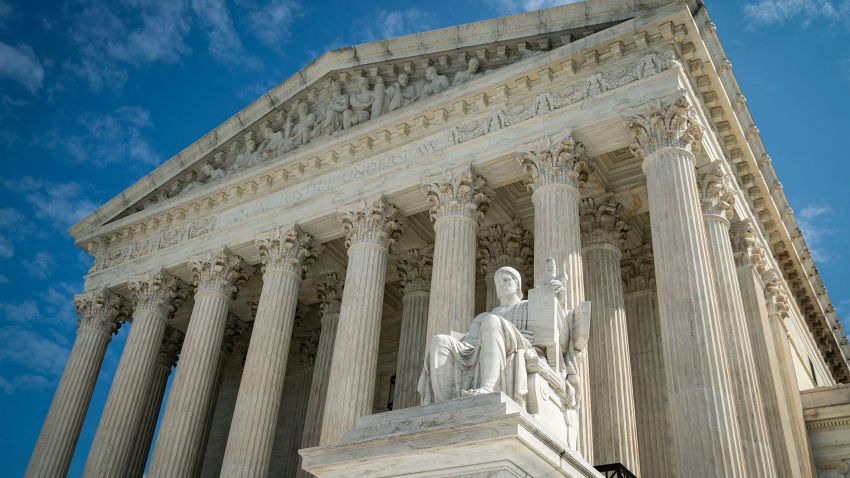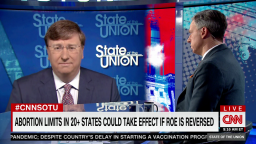Editor’s Note: Mary Ziegler (@maryrziegler) is the author of “Abortion and the Law in America: Roe v. Wade to the Present” and the forthcoming book “Dollars for Life: The Antiabortion Movement and the Fall of the Republican Establishment.” Aziza Ahmed (@AzizaAhmed) is the author of the forthcoming book “Feminism’s Medicine: Law, Science, and Social Movements in the AIDS Response.” The views expressed in this commentary are their own. Read more opinion articles on CNN.
Often, the fate of Roe v. Wade looms over the confirmation hearing of any prospective Supreme Court justice. This time feels different. This week, Ketanji Brown Jackson takes questions from the Senate Judiciary Committee as the Supreme Court continues to deliberate whether it will undermine the fundamental right to abortion when it rules on a Mississippi statute that bans abortions after 15 weeks of pregnancy.

A number of red states are already counting on a decision reversing Roe. Lawmakers have introduced and sometimes passed another wave of restrictions, all of them unconstitutional under current law. This trend took on particular momentum beginning in 2018, when the Court first had a conservative majority seemingly poised to reverse Roe, conservative lawmakers have introduced laws that violated abortion rights to give the Court a chance to destroy them.

But what is new is what we can learn from the most recent abortion bans. These are no longer vehicles to bring a challenge to the Supreme Court. The new restrictions offer a preview of what states wish to do when Roe is overturned. Some, like Florida, have hedged, introducing 15-week bans like the one in Mississippi that the Supreme Court is likely to uphold. Others have more clearly tipped their hand, focusing on strategies not only to criminalize abortion but to stop people who can get pregnant from circumventing state bans.
Missouri captured headlines with two major abortion bills – one intended to stop travel out of state and a second criminalizing the “trafficking” of abortion drugs. Particularly shocking was a provision that increased the penalty for the use of abortion drugs to treat ectopic pregnancy, which involves the implantation of a fertilized egg outside the uterus. Life-threatening if not treated, ectopic pregnancy never leads to a healthy birth.
Missed in the justifiable uproar about Missouri’s ectopic pregnancy provision is the larger question tackled by both Missouri bills: how to enforce criminal abortion bans if states plan to pass them. That is no easy feat. In America, women can travel out of state or order abortion pills online, and according to the Guttmacher Institute, in 2020 medication abortion accounted for over half of US abortions. One answer seems to be to treat the possession or importation of abortion medication as drug trafficking.
At least if the Missouri bill offers any example, these provisions will reach beyond doctors to criminalize anyone involved in advertising, transport to or support for abortion. And history suggests that a broad category of “accomplices” can face consequences when abortion is a crime.
In the late 19th century, when states began criminalizing early abortions, few authorized the punishment of women. Even in those that treated women as “accomplices” in their own abortions, prosecutors rarely pursued them. But women were forced to testify not only against doctors but also against lovers, friends, and others who helped them get abortions. After the Supreme Court overrules Roe, a new punitive chapter seems set to begin.
That’s because “trafficking” has always been a term that conservatives have relied on to ramp up criminal law interventions in the context of public health. Abortion may fall prey to this bait-and-switch.
The turn to criminal law and punitive measures to address public health issues is not new in and of itself. The war on drugs, declared by President Richard Nixon in 1971, offers a powerful example of a challenge facing individuals and communities that could have been solved with public health interventions. Nixon had signed the Controlled Substances Act into law a year before, and he oversaw the creation of the Drug Enforcement Agency in 1973, but in the 1980s, President Ronald Reagan expanded many of Nixon’s policies.
Instead of funding social services from health care to housing, the Reagan administration poured millions of dollars into incarcerating people who used drugs. This contributed not only to poor public health outcomes but also to the phenomenon we now recognize a racialized system of mass incarceration, condemned by those on the right and left alike. The war on drugs also led to the criminalization of harm-reduction measures, including the distribution of clean needles, that have been cast as aiding and abetting in the crime of drug use.
The law in Missouri mimics these moves from the war on drugs in its emphasis on being punitive rather than reducing harm. The Missouri law makes it possible for the state to charge people with trafficking if an individual takes part in a range of activities that could include simply providing an individual with medication abortion – or carrying it across state lines. The FDA has approved the use of medication abortion up to 10 weeks of pregnancy. The Missouri law subjects doctors who follow those guidelines to up to 15 years in prison.
Adding the label of trafficking, which conjures in the minds of many images of crimes occurring in the shadows, belies the reality that the very “crime” that the law descries is an FDA-approved protocol widely used in the United States and around the world. Rather than support women’s access to reproductive health services – or provide support for people who wish to continue pregnancies – the law defines medication abortion as a crime and brings the criminal law to bear on service providers. The fear of arrest and prosecution alone will impact the ability of women to access abortion.
And if international examples tell us anything, it is that criminalization does not lower the actual abortion rate. Countries that criminalize most abortions, such as Kenya and Ecuador, have persistently high rates of abortion.
Get our free weekly newsletter
The war on drugs was famously ineffective too. The opioid epidemic began when the government was funneling resources into the drug war. Between 1999 and 2019 alone, nearly half a million Americans died of opioid-related overdoses. Decades after Nixon declared the war on drugs, the United States is experiencing a surge in overdose deaths. One can only ask: How might this outcome have been different if more of the money sunk into a failed drug war had been used to address the opioid epidemic in its nascent stages?
Across the political spectrum, Americans acknowledge that the war on drugs was a failure, and yet its logic has been transported into the realm of abortion. How long will it take to realize that the war on abortion will be a failure too?


















